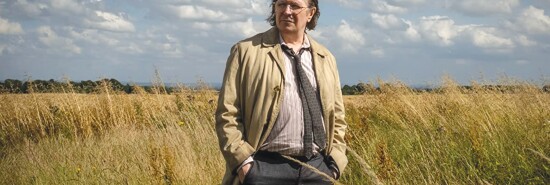
The spies who came in from the grim
J. Oliver Conroy
In the first season of Slow Horses, Apple TV’s stylish and entertaining British spy show, a disheveled intelligence chief, Jackson Lamb (Gary Oldman), gathers his officers in a moonlit cemetery. He and the group are on the run, possibly having been betrayed by their own government, and one of their colleagues has just been shot and may not survive.
“Look, I don’t normally do these kinds of speeches,” Lamb says, by way of a pep talk, “but this feels like a big moment, and if it all turns to s***, I might not see any of you again.” As the other characters wait expectantly, he adds, “You’re f***ing useless, the lot of you. Working with you has been the lowest point of a disappointing career.”
Based on a beloved series of novels by Mick Herron, Slow Horses brings an enjoyably slouchy and cynical energy to the fairly well-trod ground of the espionage genre. The “slow horses” of the title work at the fictional Slough House — a dilapidated branch of MI5 so far from headquarters “it might as well be in Slough” — where the British counterintelligence service relegates officers who have embarrassed themselves or the agency. Sentenced to career purgatory, Slough House’s crew of eccentrics waits out retirement while handling operations too unglamorous, or too risky, for headquarters to touch.
Their leader, Lamb, is a whisky-swilling slob who delights in his own rudeness. (Oldman, clearly having a great time, portrays him with panache.) River Cartwright (Jack Lowden), an ambitious young officer sent to Slough House after a colossal mistake during a counterterrorism exercise, has only been saved from sacking by his grandfather (Jonathan Pryce), a respected retired MI5 officer. The other Slough misfits include the brittle Louisa Guy (Rosalind Eleazar); a capable but graceless hacker, Roddy Ho (Christopher Chung); the seemingly timid, recovering-alcoholic office administrator Catherine Standish (Saskia Reeves); and the nebbishy Min Harper (Dustin Demri-Burns), assigned to Slough House after forgetting a classified document on a train.
The officers of Slough House try to stay on the good side of MI5 headquarters, whose smooth and dangerous deputy director of operations — Diana Taverner (Kristin Scott Thomas), mockingly called “Lady Di” — has no compunction about throwing them under the bus, often with the help of her oily, posh lackey James “Spider” Webb (Freddie Fox), an old schoolmate of River’s turned foe.
The show is a fairly faithful adaptation of Herron’s novels. The show’s first season concerned a reckless MI5 false-flag operation that incited a far-right group to kidnap a young Muslim man. The current season, which debuted earlier this month on Apple TV+, opens with the discovery that an aging British ex-spy has died in what seems, to most people, to be natural circumstances.
Lamb believes something more sinister is afoot: that reactivated KGB sleeper agents may even be running amok in London. Characteristically, River soon gets in over his head. Lamb uses his unorthodox methods, George Smiley-style, to find out things that others have missed. And some new has-beens and washouts join Slough House, including Shirley Dander (Aimee-Ffion Edwards), who has anger-management problems, and Marcus Longridge (Kadiff Kirwan), a gambling addict.
Graced with a jaunty theme song created for the show by Mick Jagger, the show’s ethos is redolent of a less self-serious, but also slightly less realistic, John le Carré — complete with Carré-esque internal politics, hierarchies, and lingo (“joes,” “dogs,” “achievers,” “dentists”). There are no exotic locales: The MI5 is a domestic intelligence agency, and the show is set almost entirely in London and its surrounding country, a less compelling backdrop than Budapest or Cairo but one whose gray skies, curry restaurants, Georgian row houses, and oligarch-inhabited skyscrapers are very much of modern, post-7/7-attacks Britain.
Early in the series, we learn two sets of pointers for intelligence officers: Moscow rules (“watch your back”) and London rules (“cover your arse”). Both, the show suggests, are crucial for surviving different types of hostile environments. Slow Horses is not quite The Bureau — the twisty, spell-binding French espionage series that is, I believe, one of the best television shows ever made — but the British series is quite willing to kill off characters, adding an element of very real suspense, even if some of the plot machinations of the current season strain credulity.
Slow Horses’s strengths are its well-drawn characters, great performances, and strong sense of itself. And most importantly, it’s fun.
J. Oliver Conroy is a reporter and writer whose work has appeared in the Guardian, New York magazine, the Spectator, the New Criterion, and others.
